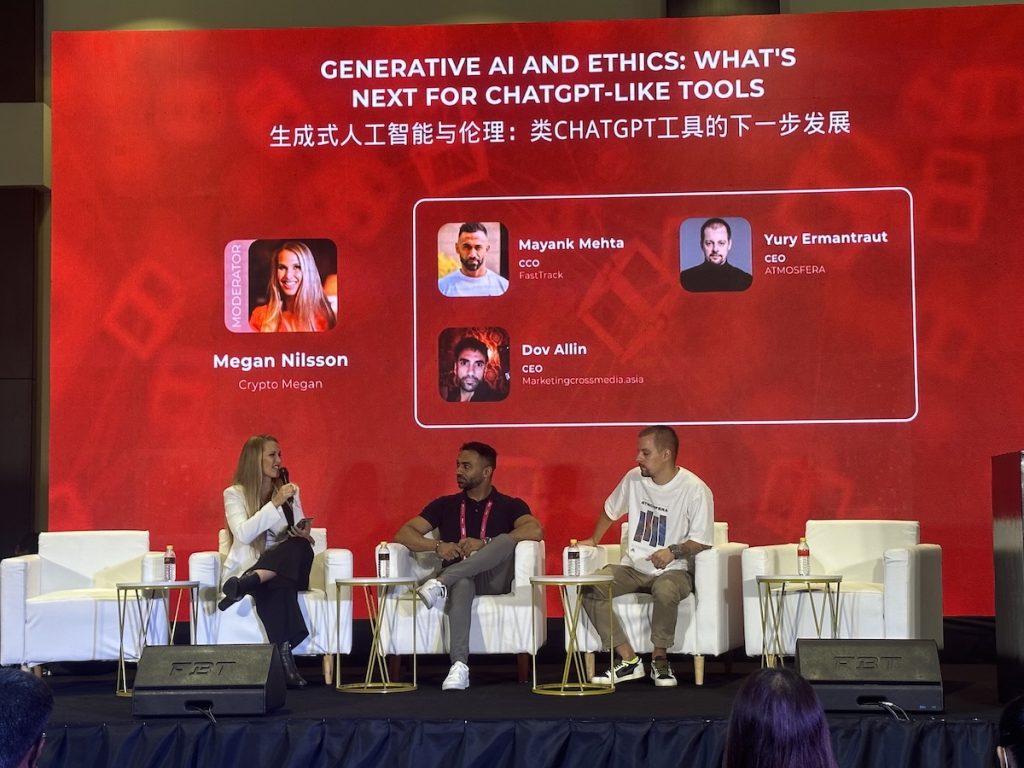Generative AI is slowly making its way into the public sphere, with an upswell of users of options such as ChatGPT. Practical use cases for gaming operators are myriad, with some experts pointing out which ways to best deploy the tool and how AI can change our lives for the better.
Speaking at a panel at Sigma Manila, Mayank Mehta, CCO of FastTrack, noted that tools such as ChatGPT are “making interactions more meaningful and personalized for their player base”.
Mehta points out that AI IS “essentially self-learning”, noting that the software aims to mimic what a human can do “using his/her intelligence: logical communication and personalization”.
This personalization aspect could have a key role in the roll-out of AI for punters, as it provides a spectrum of bespoke content whether online or offline – with practical applications for game developers, marketing teams, operators, aggregators and platforms.

From an overarching point of view, Megan Nilsson – also known as Crypto Megan – notes that AI will “free you from the busy work and allow you to focus on the more elevated functions of your job”.
A practical display of this is AI-tools such as ChatGPT being used to write up marketing campaigns, provide summaries of player behavior, create designs for games, summarize conference calls, provide action points and even strategize in which markets games could best be deployed in.
But all of this depends on the proper prompts. Much like expecting a chef to make an incredible meal without the proper recipe, AI requires specific instructions to make it work to your needs.
Yuri Ermantraut, CEO of game developer Atmosfera, notes that “you can teach AI to do everything but you need to input the relevant amount of data to the system and explain what you need to do in order to make that decision”.
Yuri urges incoming users to “spend time to use it properly”, noting that tools such as ChatGPT have enormous potential but are often disregarded after users achieve mediocre results by not selectively inputting enough information.
“If you have a lot of data, that’s what it is good for right now. But if you’re expecting to create something new, it’s not good for that yet […] humans are more creative than AI”.
Looking at the iGaming sphere, Mayahnk Mehta, CCO of FastTrack, notes that tools such as ChatGPT are particularly relevant for “generating more interesting campaigns for players”, noting that the tech has not yet evolved to our far-futuristic expectations but that the tools are streamlining delivery while humanizing the message, as users can dial in tone and delivery to maximize their marketing push.
But the exact effect needs to be tested on the audience, and those applying these tools need to do A-B tests – firing out different versions of their desired content based upon different prompts within the AI software.
“You need to enter prompts that can give answers that are more in tune [with your audience base],” notes Mehta, “to see which prompts are best for your audience and best interact with your community”.
FastTrack is already applying AI to its in-house meetings – to help summarize points discussed, come up with actionable measures, and then create a summary to go out to all participants – a practical application nearly every business could apply, especially when dealing in the virtual world.
Looking at the gaming world, Yury notes that tools such as ChatGPT are imperative in gaining a comparative advantage.
“Our product team uses AI in comparing data, using ChatGPT can do it quite quickly, for example – when we’re creating a bonus for a new game, we can use ChatGPT to compare all bonuses currently on the market,” synthesizing the data and coming up with the best option for the developer to beat out competitors.
The applications extend beyond, with Atmosfera’s team also using AI for its design, chat functions and even for staff retention – realizing the need to keep talents while leveraging AI to support their activities: eliminating the busy work such as filing work reports.
The main aim is to “eliminate redundant work”, notes Mehta.
But the method is by no means perfect, with the FastTrack CCO even doing A-B tests with a legal team to see whether advice from lawyers or from ChatGPT was more relevant.
The results: a mixed bag.
“We’re still scratching the surface and we have to see what the future holds. For every technology that’s been around so far, there have been upsides and downsides but the upsides have usually trumped the downsides,” notes Mehta.
Ermantraut opines that AI currently is more limited to human input, stating that “you can teach AI to do everything but you need to input the relevant amount of data to the system and explain what you need to do in order to make the decision […] people usually make decisions using emotions and until AI has a heart it won’t [be able to mimic this]”.
“This is a very important breakthrough,” notes Mehta, pointing out how quickly ChatGPT swelled to millions of users after its debut.
Now, industry players just need to figure out how to maximize its potential and see what competitive advantage they can gain as everyone swarms to the AI bandwagon.











